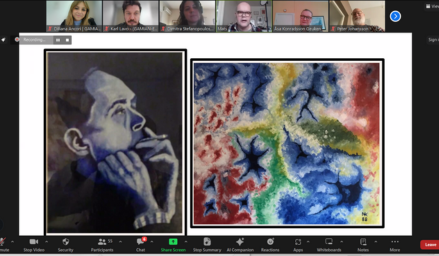 Yesterday, GAMIAN-Europe, in collaboration with EUFAMI, held the ‘Artistic Minds’ webinar to highlight the ongoing ‘Vibrant Mind’ project, a mental health initiative launched earlier this year by GAMIAN-Europe.
Yesterday, GAMIAN-Europe, in collaboration with EUFAMI, held the ‘Artistic Minds’ webinar to highlight the ongoing ‘Vibrant Mind’ project, a mental health initiative launched earlier this year by GAMIAN-Europe.
This project, with an initial launch in Croatia featuring an art exhibition, aims to celebrate the intersection of mental health and art. Péter Kéri, President of GAMIAN-Europe shared his personal experience with schizophrenia, underlining the critical role of such initiatives. The webinar unfolded across three main sections.
Art as Expression and Personal Stories
Julia Pivén shared her experience of starting an artist association that evolved into a mental health association while Artist Peter Johansson discussed how his condition shapes his passion for photography, Åsa Konradsson Geuken, A. Prof. in Neuropharmacology, alongside her brother Mats, explored the therapeutic role of art in coping with schizophrenia. Mats’s transition towards a more authentic artistic expression, influenced by his condition, was a focal point, offering insights into the complex relationship between creativity and mental health.
The webinar then shifted focus to Vincent Van Gogh, with Dimitra Stefanopoulos, from EUFAMI, who presented a talk on the life of the Artist and the relationship with his brother, Theo. Dimitra highlighted Vincent’s struggles with mental illness and how his art reflected his emotional state.
When Culture and Mental Health come together
Maritina Kontaratou, from EDRA, talked about the ‘Art for More festival’, an initiative since 2007 that intertwines visual culture with mental health advocacy. The unique “Art Residences in Mental Health Units” programme was also highlighted, underscoring the festival’s innovative approach to mental health support.
Lars Münter, Director of International Projects, Danish Committee for Health Education (DCHE), discussed the varied applications of art therapy across Europe, stressing the significant differences in approach between countries. He emphasised the importance of understanding and appreciating this diversity, rather than trying to impose a one-size-fits-all solution. Despite its effectiveness and popularity, he also touched on the underfunding of art therapy. Lars expressed a desire to repeat the project, this time with a focus on integrating young people better and promoting their use of art for mental health. Finally, Spiros Zorbas from EPIONI shared insights into the challenges faced by caregivers in Greece, advocating for policies to acknowledge their significant contributions. The discussion also covered the strategic use of art therapy in psychiatric healthcare and the potential of art in supporting mental health.
Cultivating Support through Art
Oriold Károly, Art Therapist from LOKA, and David Somekh, Network Director of the European Health Futures Forum (EHFF), spoke about the therapeutic impacts of group processes and the importance of creating supportive environments for individuals with mental health conditions. David emphasised the concept of the “container,” referring to the need for patients to feel contained and secure. He stressed the significance of relational security and the role of human interactions in understanding and helping those with mental health issues. The conversation underscored the significance of relational security and personalised care in fostering a healing environment.
The webinar concluded with a note of gratitude for all the speakers and organisers, a dialogue on alternative mental health services, an investigation of the growing reliance on protocol-based therapies, and a reminder about the ongoing Vibrant Mine project, as proof of the interconnection of art and mental well-being, fostering a supportive community for individuals experiencing mental health conditions.
Find more about Vibrant Mind Project here